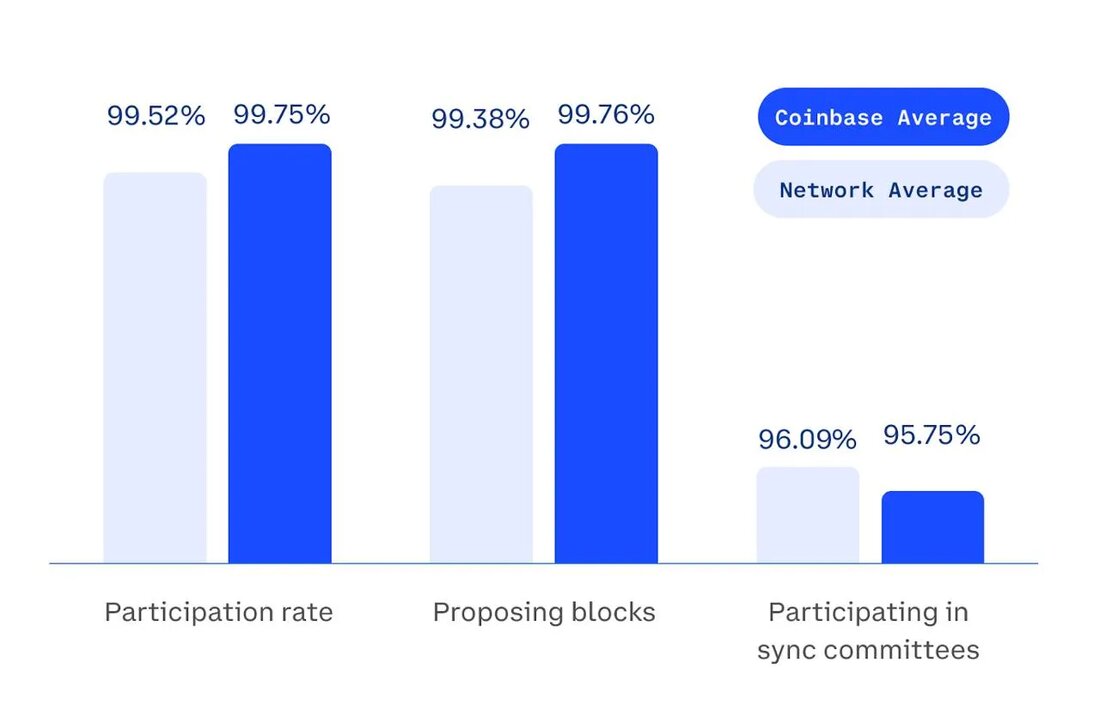Coinbase as the largest node operator for Ethereum: 120,000 validators and 11.42% of the ETH supply secured
Coinbase as the leading node operator for Ethereum Coinbase has established itself as the largest node operator for Ethereum, with an impressive 120,000 validators. In a recent report, the exchange revealed that it has 3.84 million ETH under management through its validators as of March 4, representing 11.42% of the total Ethereum in circulation. High availability and security focus The report, which was intended to provide insight into Coinbase's operational performance, shows that the company recorded 99.75% uptime in February 2025. This means that Coinbase’s validators were online and operational for 99.75% of the month. Although an availability of 99.9%...

Coinbase as the largest node operator for Ethereum: 120,000 validators and 11.42% of the ETH supply secured
Coinbase as the leading node operator for Ethereum
Coinbase has established itself as the largest node operator for Ethereum, with an impressive 120,000 validators. In a recent report, the exchange revealed that it has 3.84 million ETH under management through its validators as of March 4, representing 11.42% of the total Ethereum in circulation.
High availability and security focus
The report, which was intended to provide insight into Coinbase's operational performance, shows that the company recorded 99.75% uptime in February 2025. This means that Coinbase’s validators were online and operational for 99.75% of the month. Although 99.9% uptime would theoretically be possible, Coinbase did not aim for this goal for security reasons.
The decision to keep availability above 99% but below 99.9% is to avoid security concerns such as duplicate signatures. Coinbase has not experienced any double signings or penalties (slashing) since its inception. Slashing is a penalty in which validators lose a portion of their stake if they violate network rules.
Coinbase emphasizes:
"Aligning with 99.9% requires security compromises that can increase the risk of double signing, resulting in penalties. At Coinbase, high uptimes are important, but we always prioritize the security of our customers' assets over availability."
The improved availability in February is also attributed to an architectural upgrade that allows validators to continue operating even during maintenance on the Beacon node.
Participation rates and concerns about centralization
In addition to high availability, the report also shows a 99.75% participation rate, which captures the number of validators who successfully execute their consensus submission. This is above the network average of 99.52%.
Disclosing its stake in Ethereum has raised concerns about the centralization of the network. Although Coinbase's 11.42% share is less than Lido's, Coinbase remains the largest node operator. Lido, on the other hand, functions as a collective where smaller stakes are possible per node operator.
Some in the crypto community, including Daily Gwei founder Anthony Sassano, have praised Coinbase's transparency. However, others express concerns that this large stake could threaten Ethereum's centralization. Coinbase responds in its report, pointing to the diversity of its validators as evidence of the network's decentralization.
Diversification and geographical distribution
The exchange highlights that it has two consensus customers, two execution customers and six relay customers. The consensus clients, Lighthouse and Prysm, account for 63.8% of the total distribution, while Geth and Nethermind account for 79% of the execution clients. This suggests that Coinbase’s clients dominate the Ethereum network in both consensus and execution.
Despite this dominance, Coinbase validators have also taken precautions in terms of minimizing centralization: six different MeV relays are in use, four of which are not censored. Recognizing the risk of diversification, Coinbase plans to further improve its customer diversity by evaluating the production readiness of two additional implementations.
The geographical distribution of validators is another point where Coinbase aims for decentralization. These are active in five countries: Singapore, Japan, Ireland, Hong Kong and Germany. In addition, two cloud providers, Amazon Web Services and Google Cloud Platform, are used.
Overall, Coinbase positions itself as a responsible node operator that takes both high availability and security concerns seriously, while also addressing the issues of decentralization and transparency.

 Suche
Suche
 Mein Konto
Mein Konto
